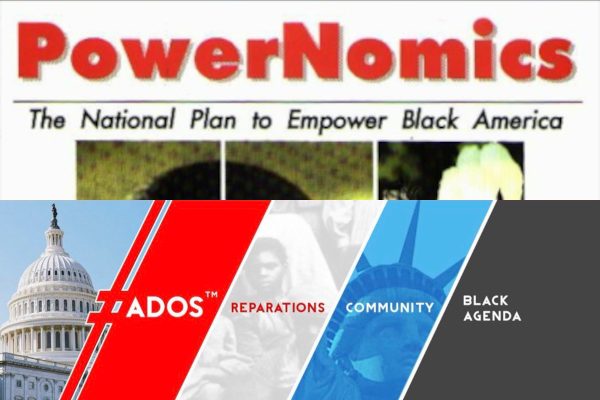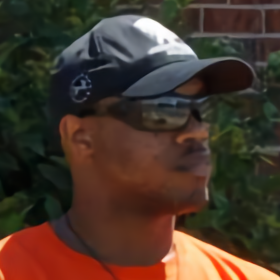Group Economics Versus Reparations?

On March 1st, 2024, Yvette Carnell of the American Descendants of Slaves (ADOS) organization wrote a Twitter threaded response to a video encouraging Black American group economics, or "PowerNomics" per Dr. Claud Anderson. She stated that political work was being underestimated and is far more important for Blacks to acquire true equality in the United States. Many within the same thread argued that focusing on supporting Black-owned businesses is an attempt to avoid politics. I disagree with both, slightly. Readers new to my blog likely don't know that I focus heavily on highlighting Black-owned businesses. That's my bias upfront. I'll amend both arguments, being as unbiased as possible.
TL/DR: I avoided politics by starting to support Black businesses and learning true Black history first as a foundation before getting political. It worked for me. Buying from Black-owned businesses alone won't kill systemic racism, though. We need to support, and start, Black-owned businesses and get involved in politics, not just one.
What are Asians Doing Differently from Blacks?
This is the post sister Carnell is criticizing:
Go do it then. Go be “like the Asians” or “like the Jewish community”. Nobody’s stopping you, right?
— Yvette Carnell 🇺🇸 (@BreakingBrown) February 29, 2024
The first thing you’ll learn is that these groups engage in serious politics. Not the politics which has y’all at hustler mixers & expos
No need to finger-wag us from the forest https://t.co/djVsbhKFmU
To be fair, sister "Erica" didn't say much in those 54 seconds except "Asians [...] have the lowest voter turnout, yet they own a lot of their communities" and "what do they know about group economics?" Within the thread, Carnell posted a screenshot from "The Asian American Vote in 2020: Indicators of Turnout and Vote Choice" stating:
"The percentage of Asian Americans who turned out to vote in the presidential election broke new records in 2020. Analysts estimated that 60–62% of eligible Asian Americans adults turned out to vote in 2020. The rate of turnout increased from the previous presidential election cycle for Asian Americans, bypassing the rate of change for whites, Blacks, or Latinos between 2016 and 2020 (Ghitza & Robinson, 2020; Ramakrishnan, 2021)."
So, the first point in the video is wrong. The Black Authority (TBA) recently explained how Asians' "Model Minority" strategy of fighting against Blacks isn't working how they hoped. Both points by Carnell and TBA disprove Erica's argument that Asians "own a lot of their communities" because of presumably group economics alone. This is where my amendment to the politics versus group economics dispute begins.
PowerNomics, the National Plan to Empower Black America...is Inactive
Someone in the thread argued that Blacks focusing on group economics "has literally been the strategy since the end of the civil rights movement." Problem: the strategy, plan of action, has been poorly executed for at least the past three decades. I rarely see American descendants of slaves, or freedman, not to ignore the Foundational Black American (FBA) initiative, actively support Black-owned businesses. I'm no Black history expert, but I read as much as I can about Black history. I've never read that Black wall streets like in Tulsa and Durham, and especially not the earlier "maroon communities," led to political strength at the local, state, or federal level, at least not in a way that favors Blacks. Let me know if I'm wrong. On the contrary, the Color of Law book provides numerous examples of how such attempts were thwarted as soon as possible by:
- Federal Housing Administration's (FHA) refusal to lend to projects planned to house Blacks
- Gerrymandering to weaken Blacks' voting power
- Veterans Affairs (VA) home loans restricted from Black veterans
- Police departments' inaction to prevent and stop anti-Black race riots, or pogroms, many of which could be investigated under the Emmett Till Unsolved Civil Rights Crime Act
- Whites' outright refusal to sell homes to Blacks
People throughout the country worked to prevent Blacks from owning homes and their communities with their own resources, forcing us to rent instead. We've yet to do much to counter this. If you wish to be a part of the solution, I recommend starting with Dr. Claud Anderson's PowerNomics book series to gain a solid foundation of Black history knowledge. Or, read my short PowerNomics book summary with resources related to the relationships between Blacks and politics, self-Sufficiency, etc.
Politics Directly Affecting You Right Now
To Yvette's point, I found it easier to start my pro-Black journey by supporting Black-owned businesses instead of jumping into politics. I didn't plan to avoid politics. I didn't know where to start other than paying more attention to then-president Donald Trump's shenanigans. So I opted to build momentum now by gaining pro-Black experience through something easier to do. I also wanted to learn true African American history first to better understand the "why" behind everything affecting us now. As I learned more about the politics within certain subjects, I talked more about them. I don't know anyone who actively shops from Black-owned directories, but it wouldn't surprise me if some believe, or hope, that "Black first" (B1) consumerism is enough alone to resolve the Black struggle.
Seeing the Afro-centric apparel in the first Black Panther movie inspired me to discover D'iyanu, a brand I still support often. Yes, I still consumed, though it was within the African diaspora. No, my purchase didn't change any policies or strengthen the community. But it was actionable. It was my beginning to prioritizing my own people. enabled me to influence African Americans to be more mindful of where we spend our money. Most importantly, it immediately transformed me into someone you could look at and say "hey, that's a dope shirt," granting me the opportunity to evangelize supporting Black-owned businesses.
A viral "average at best" video was ultimately the reason I saw Kevin Samuels' breakdown of an all-Black women panel disrespecting Ice Cube's Contract with Black America (CWBA). In that video he mentioned Dr. Claud Anderson, Yvette Carnell, and other pro-Black activists focused on building the Black community.
Supporting, following, and working with more Black business owners and pro-Black content creators exposed me to more people in the pro-Black space and opportunities to contribute. The PowerNomics library pack, and other Black history books I read afterwards, armed me with knowledge about the history of US politics disenfranchising Black Americans. Those books helped me better understand what's going on. Pro-Black and Pan-African bloggers, YouTubers, and other influencers keep me updated on events affecting Black communities nation-wide and provide different perspectives. Because of all this, I know I'm not alone. It is simply more difficult to find like-minded individuals.
I know where to go when I have questions about the history of anti-Black racism in:
- Police brutality and prison labor
- Mass surveillance
- Healthcare
- Unemployment
- Genealogy
- Historically Black Colleges and Universities (HBCUs)
- Reparations
- Music industry
- US Military
- Mainstream media (MSM) representation
- Black caricatures in TV and movies
- Radio payola
- Falsely narrating the Black Lives Matter (BLM) movement
- Anti-Black misandry
- And so on...
All these topics have roots and create straight-forward paths in US politics and laws.
"Learn about politics" is too broad and intimidating a call-to-action (CTA) to spark action in many Black people. It was for me. Many have the defeated mindset that it won't matter because "the white man." Fortunately, Blacks avoiding politics upfront can find their way into the space by starting with politics regarding their current situations. No, we don't have time to be lackadaisical about Black politics. A concise CTA can at least streamline the process for some.
HBCU students and alum should know why HBCUs exist and how are underfunded. That can spark students to take corrective action similar to what Maryland HBCUs did in 2021 (reparations).
Black voters must understand that simply voting democrat isn't helping us, especially with Black presidential candidates Dr. Cornel West and Deon D. Jenkins running as neither Democrat or Republican.
Healthcare professionals should be empathetic to how the non-consensual usage of Henrietta Lacks' cells and Tuskegee Syphilis experiment on Black citizens deteriorated our trust in doctors, nurses, and pharmaceutical companies. COVID-19 reignited that flame.
The push for Blacks' reparations should remind families of the importance of having a detailed, verified family tree going back as far as possible. I learned a lot from researching the Spratley family.
Black parents should understand the relationship between police brutality and the incidents involving George Floyd, Michael Brown, Darren Seals, H. Rap Brown (Jamil Abdullah Al-Amin), and the BLM movement. That should spark them to organize with neighboring parents to demand better protection of their children.
— King D Seals (@KingDSeals) September 1, 2016
I could keep going. Put plainly, I'm not against politicking. I want to ensure we're pushing actionable CTA's most likely to spark the right action.
Supporting Black-Owned Businesses
Supporting ADOS-owned businesses, or FBA-owned businesses, should work as a great conduit for Blacks to work together more as a foundation for organized political movement. As more of us work together, brothers and sisters who've checked out from Black unity are more likely to return to the Black community. Its not happening enough, though. The issue is the same at HBCUs. The opportunity is here, yet few take it and collaborate with like-minded individuals for grassroots movement.
Group Economics and Political Activism are Needed
Blacks must better support each other in business and academic ventures, and all aspects of life. We must also focus more on politicking than the tried and true distractions such as performative representation, sports, and attempts to align us with other groups who don't suffer the same issues to the same degree as Black Americans. Two popular examples:
- Biracial, indigenous, and people of color (BIPOC)
- Lesbian, Gay, Bisexual, Transgender, Queer, Intersex, and Asexual (LGBTQIA+)... the gays
Here's a quick "getting started guide." Search "Black-owned businesses near me," and select two that interest you most. Verify they're Black-owned. Follow and purchase from them. Starting learning the history and current affairs related to a current struggle.
There is only one us and we can work in groups taking different approaches. We spend too much time arguing with ourselves. Let's take different approaches and see what works. We need change. As the great poet from Gary Indiana said, "I'm starting with the man in the mirror"
— Engineer (@Engineervlsi) February 29, 2024
Tags: black-community





